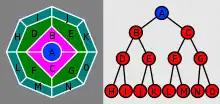Susu (informal loan club)
A susu or sou-sou or osusu or asue (also known as a merry-go-round,[1] Partner or Pawdna in Jamaica [2] sol in Haiti[3] and Njangi in Cameroon[4]) is a form of rotating savings and credit association, a type of informal savings club arrangement between a small group of people who take turns by "throwing hand", as the partners call it. The name is used in Africa (especially West Africa) and the Caribbean.[5] The basic principle is that each member of the group makes a standard contribution to a common fund once per some time period. Then each period the total contributions are disbursed to a single member of the group. The recipient changes each period in a rotating fashion such that all the members of the group are eventually recipients. Participants of a susu do not make a profit, but receive their contributions as a lump sum and is a forms of savings clubs.[6]
Overview
A member who receives a distribution early on effectively receives a loan. They collect a larger sum of money early and "repay" as they make contributions going forward. A member who receives a distribution toward the end of a rotation has effectively been "saving" their contributions leading up to the disbursal.[7][8]
Traditionally the arrangement is conducted in cash and without any interest charged. The organizer of the sou-sou may be compensated for their efforts as a courtesy. Since a sou-sou is not a written or legal contract it relies on personal trust to discourage malfeasance. For this reason it is more likely that the participants are members of the same community and know each other.
The concept of a susu is used throughout the world and has over 200 different names that vary from country to country. The funds are generally gathered with a set amount contributed from family or friends each week.[9] An estimated three quarters of Caribbean immigrants in New York participated in susus during the 1980s.[10]
Susu scams

Scammers have set up pyramid schemes which imitate or pretend to be susus. In contrast to traditional susus (in which participants only receive the money they put in without profit), these schemes promise a profit. Additionally, these scheme promise rewards for recruiting more people to the susu, in effect making it a pyramid scheme.[7][5][11]
These fake susu scams (also known as "blessing looms" or "gifting circles") increased during the 2020 COVID pandemic, and are often targeted to African-Americans under the guise of being the traditional African and Caribbean practice.[12][6]
See also
- Susu account
- Tanda, the Latin American version of the system
- Rotating savings and credit association
- Hui (informal loan club)
References
- How To Buy A Goat When You're Really Poor? Join A "Merry-Go-Round"
- "Jamaica's ROSCA: The Partner System"
- "Haitian Informal Finance"
- "The Njangi: An African Financial Support System - African Vibes". 16 May 2019.
- "Investor beware: Traditional African 'sou-sou' savings clubs have become the latest pyramid scheme". Pittsburgh Post-Gazette. Retrieved 2021-04-21.
- Singletary, Michelle. "Perspective | Some Black promoters of illegal pyramid schemes are using the Black Lives Matter movement to justify 'sou-sou' scams". Washington Post. ISSN 0190-8286. Retrieved 2021-04-21.
- "A real or fake savings club?". Consumer Information. 2020-08-10. Retrieved 2021-04-21.
- "Everything You Ever Wanted to Know About Those Sou-Sou Savings Clubs African and Caribbean Women Love". Essence. Retrieved 2021-04-21.
- Abramsky, Sasha (October 22, 2000). "Newcomers Savings and Loan". New York Times. p. CY4. Retrieved September 9, 2018.
- "Jamaican Emigres Bring Thrift Clubs to New York". New York Times. June 19, 1988. p. 34. Retrieved September 9, 2018.
- Chatman, Samantha (2020-09-22). "Boards, sou sou, blessing looms: IL AG, BBB warn of uptick in pyramid schemes in Chicago area". ABC7 Chicago. Retrieved 2021-04-21.
- Singletary, Michelle. "Perspective | Illegal pyramid schemes are on the rise during the pandemic". Washington Post. ISSN 0190-8286. Retrieved 2021-04-21.